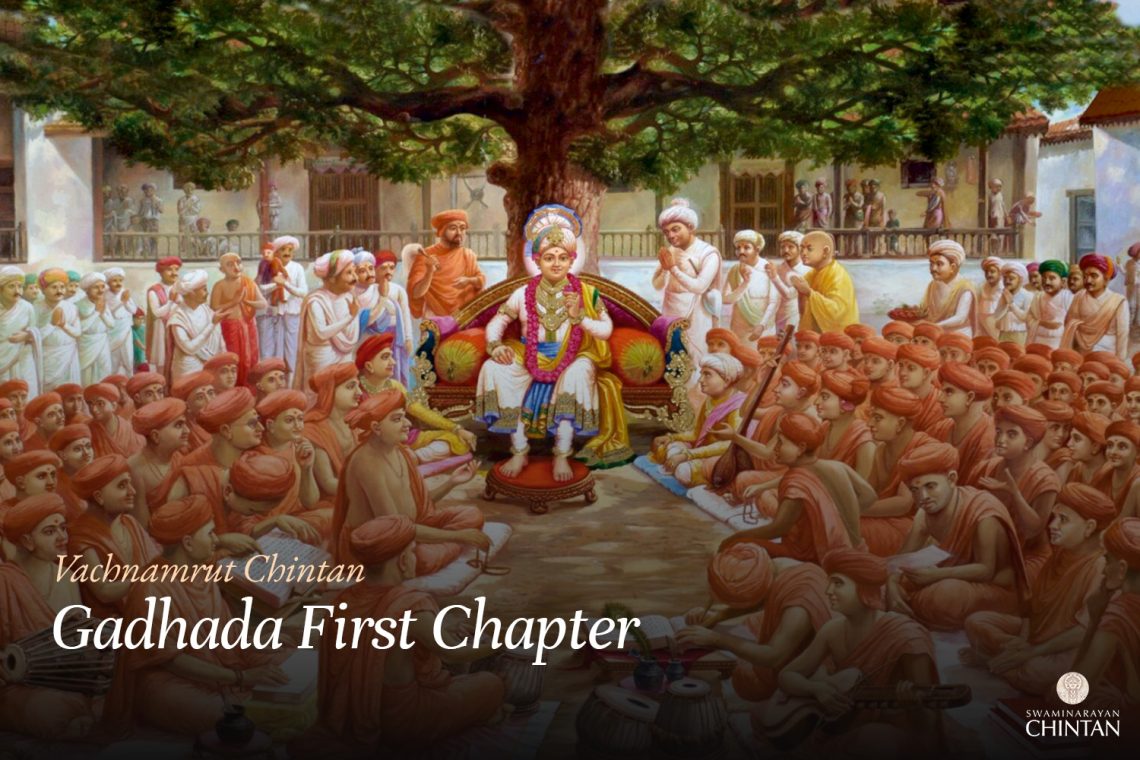Central Insights:
- The charaasticts of progressing and falling from satsang.
Key Points:
- To think of oneself as superior is the cause for falling from Satsaṅg. Until one has this thinking, he stays unhappy in Satsaṅg.
- If one accepts other devotees as superior to himself, then he himself increases in Satsaṅg and feels happiness of the Satsaṅg in the heart.
Explanation
This Vachanāmrut is about the analogy of half-burnt wood. One who does not have a fervor for God or the devotees of God in his heart cannot even grasp their virtues; the state of his inner-self is said by Maharaj to be like half-burnt wood. It neither ignites nor cools down completely but only emits smoke. Dense smoke arises from it. It doesn’t open the eyes of the people around but rather causes them to tear up. Only those who are close to this smoky wood can experience this. If one cannot appreciate the virtues of a true devotee of God, there is no illumination in their inner-self regarding the path to their own salvation. Just as there’s no light in smoky wood. Moreover, it clouds the vision of the society around them.
Maharaj says that if one is to fall from Satsang, he constantly feels restless day and night. He cannot sit peacefully anywhere during the day, and at night, he can’t sleep. Constant agitation and anger dominate his mind. As days pass, ill thoughts increase. He sees no good in anyone in the Satsang. In his mind, he constantly feels that why doesn’t anyone understand like him? He believes that everyone else is ignorant. He thinks he alone understands the truth but no one gets him. Such a mindset is indicative that he is on the decline in Satsang. So much so that even the days he spends in Satsang will be filled with discomfort, and eventually, he will leave.
On the contrary, Maharaj says, when one’s growth is imminent in Satsang, he experiences more virtuous thoughts. Every day, he sees the good in every Satsangi. He starts feeling that every other devotee is superior, and he is inferior in devotion. He rejoices in Satsang throughout the day. When such feelings prevail, it suggests the growth of noble thoughts. The more one engrosses in Satsang, the more he advances within it, ultimately achieving the stature of a great devotee.
There might be some minor flaws in them now, but there are also many virtues. So why doesn’t one see those virtues first? Why do they only see the flaws? Maharaj says that it’s because their vision is inclined towards their own progress and their own regression. The pleasure or displeasure from great souls or great devotees of God is the result of their pleasure or displeasure, not the actual truth. The results are transient, not lasting. Hence, virtues come to them first. So, Maharaj says that if one wishes to progress in Satsang, they should see only virtues in the hearts of fellow Satsangis day by day. They should consider all devotees as great, think of themselves as lesser, and always indulge in the bliss of Satsang. They should not harbor hatred or anger.
So, when such qualities are present, one should understand that they are on the path of progress in Satsang. Those who possess such an attitude, the more they stay in Satsang, the fewer conflicts they face, and they achieve great stature in Satsang. Therefore, seekers should recognize these signs and exercise discretion in Satsang. The confusion in Satsang is merely the result of ego, while peace, bliss, and the path to liberation come from humility.
Glossary
| Agitation – Restlessness and discomfort |
| Bhakti – Devotion Loving and selfless worship of God. |
| Smouldering Wood – Half-burnt log analogy |
| Satsang – Holy fellowship The association of devotees and saints for spiritual progress. |
| Superior Thinking – Ego and pride |
| Virtuous Devotee – Devotee with noble qualities |

